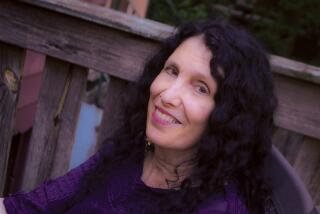A Novel That’s a Rare Find at the Awkward In-Between Age
- Share via
Come a Stranger by Cynthia Voigt (Atheneum: $13.95)
“Come a Stranger” by Cynthia Voigt is the story of Mina Smiths, a 15-year-old black girl who dreams of being a ballet dancer. At the opening of the novel, Mina is about to spend the summer at a camp for aspiring dancers. The summer is wonderful, and we see Mina flourishing despite the fact that she is the only black girl in an all-white environment. Throughout the next year, all that she can think about is returning to camp.
The second summer, however, is a disaster, for Mina has grown a lot during the year, and her body is now too large and ungainly for the delicate steps required of a classical ballet dancer. “I’m not saying it’s your fault,” her teacher tells her. “ ‘There’s nothing you can do about it . . . Nobody can really predict how a body will develop over the years of change. Your people develop earlier, which is why it’s happened to you this year.’ ”
Grapple With Self-Doubt
Mina is sent home mid-season, and her dismissal opens up a whole new line of thinking: Was she let go because she is black? Is this a question of aesthetics or really a question of racism? Mina must return to “her people” and find a way to grapple with the self-doubt and anger that she has been left with.
At home a surprise awaits her in the form of Tamer Shipp, the minister who is presiding over Mina’s father’s congregation for the summer. A fast friendship develops between Mina and Mr. Shipp, and her obsession with him soon replaces her obsession with ballet. Mina is a fierce character who always needs something to hold onto, and Mr. Shipp (as much as he can be held onto) fulfills Mina’s need.
Voigt has portrayed Mina as an independent, free thinker, yet has also left enough room for more complicated, subtle traits to shine through: stubbornness, self-involvement and loyalty, to name a few. What makes Mina Smiths unusual as a character in a Young Adult novel is the real respect the author has for her. This translates easily into a respect for young readers. Voigt is not interested in writing a “message” novel. Instead, she gives us a real character searching to figure out what it means to be different.
At times, the dialogue rings false, and we hear the authorial voice coming through. “
But even though the novel isn’t a neatly-tied package as many Young Adult novels are, one gets the feeling that this is not what the author intended. Voigt is going for something much richer: a Young Adult book that has the weight of a novel , with characters we care deeply about and an emphasis on strong, fine writing. It is easy to take pleasure in the language: “At night, there wasn’t any room except the kitchen that didn’t have somebody sleeping in it. Mina knew she was all interconnected with her family, like roots all interconnected underground, but she still felt different.”
With writers like Voigt around, it will be difficult for many readers to pull themselves away from the Young Adult section of the library and to move on to “Adult” fiction. I don’t blame them for lingering just a little while longer.
More to Read
The biggest entertainment stories
Get our big stories about Hollywood, film, television, music, arts, culture and more right in your inbox as soon as they publish.
You may occasionally receive promotional content from the Los Angeles Times.










